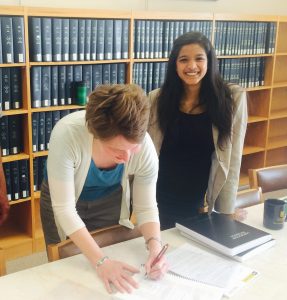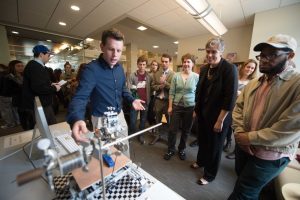In addition to the outreach events in April, we also had a lot going on to finish up Senior IS — the senior research project or thesis that all Wooster students complete. You might think that IS Monday is the end of IS, but after handing the thesis in, students also defend their thesis in an oral exam.
In the physics department, we ask the student to prepare a 20 minute presentation summarizing the key points of their IS project, and then after that the advisor, 2nd reader, and any other physics faculty able to attend ask questions. Since we advised a record 17 IS theses this year, it was pretty challenging just to get all of these oral defenses scheduled before the IS symposium!
I know the IS defense is stressful for the students, but as a faculty member, it is one of my favorite parts of the IS process. It isn’t that we are only asking questions that we know the answer to — rather the student is now the expert and we are really asking their opinion or perspective on a problem. Because of the way that the defense requires that we pull together information from a lot of sources, and because we have multiple perspectives on the problem, it is often a time when we figure out something new, which is tremendously satisfying.

After the question period, the student steps out for a few moments, the faculty confer, and then we invite the student back in to tell them whether they have officially passed their Senior IS. Then, we have a nice ceremony of the advisor and second reader officially signing the thesis.
Personally, I am a fan of ceremonies — it is important to take a moment and recognize an accomplishment, to take stock of where we were before and how far we have come!

Every department has slightly different traditions and requirements for their students IS defense. In physics, we have intentionally modeled it after a Ph.D. defense, and I know that it is a bit intense. For double majors, we do compromise between the traditions of the two different departments. Luckily, since we have a good number of physics – math double majors, the traditions of the Math Department are pretty close to the Physics Department, so it is not too challenging to merge our requirements.
Finally, the culminating event of Senior IS is the Senior Research Symposium, held on the next-to-the-last Friday of the spring semester. Classes are canceled for the full day, and the whole campus takes part in an awesome celebration of the research that the students have done all year.
Physics students have always been required to do a poster presentation to complete their I.S., but we used to have our own poster session all on our own. Since the IS Symposium started about 8 years ago, we’ve been able to be part of an all-campus event, which is more fun.
In addition to the posters, students can also elect to do a “Digital IS” presentation and develop alternative ways of presenting their IS research. This year, senior Nathan Johnson built a Lego Mindstorms version of a scanning tunneling microscope (STM) to show attendees the concept of how an STM uses feedback as it scans in order to map out an image of the surface of the sample. It was a bit challenging to get the built-in Mindstorms sensors to work well enough and the Lego pieces were not quite as rigid as we really wanted, but it worked to map out the surface, which was cool!

He had a good crowd interested in it during the digital IS session in CoRE, including President-elect Sarah Bolton. Since she is a physicist and actually knows how an STM works, her questions were rather more perceptive than the average ones!
Overall, the IS Symposium is one of my favorite days of the year!

Thanks, Mark! I enjoy reading your posts as well.